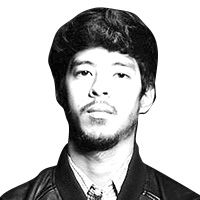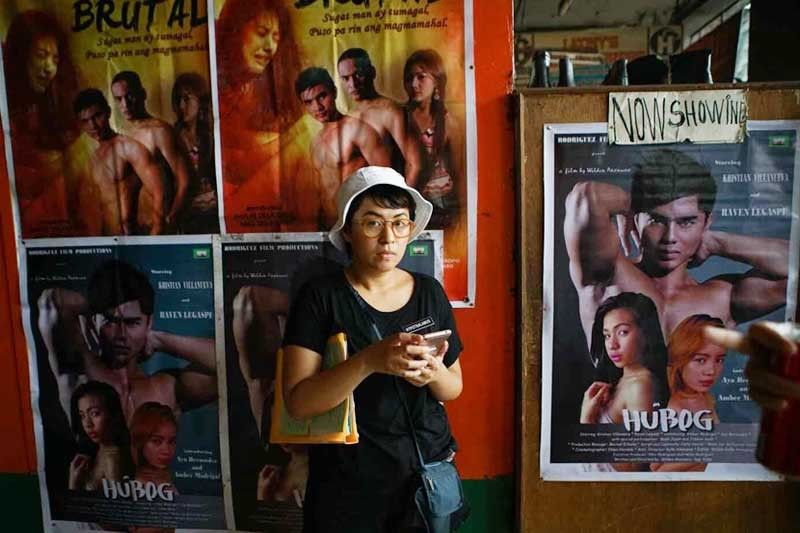Not Just Another Love Story


We talk to female filmmaker Dwein Baltazar about her work, her distinct woman characters, and making different ‘love’ stories.
Dwein Baltazar is having a hell of a year. In May, her second film Gusto Kita with All My Hypothalamus, about a woman named Aileen and the four men in various states of “in love” with her, debuted at the CineFilipino Film Festival and a Special Features Film at the 2nd Pista ng Pelikulang Pilipino in August. It then made rounds at international film festivals the notably the Busan International Film Festival.
Hypothalamus comes six years after Dwein debuted her first film Mamay Umeng at the 2012 Cinema One Originals Film Festival. The director has been at work on the script for Hypothalamus for sometime, even reaching up to 14 drafts.
“Sinubukan niyang mag-evolve I guess,’’ she tells me over email. “Pero sabi nga ni Sir Ricky Lee kapag hindi mo na alam kung saan pupunta ang material. Go back to your first draft kasi do’n ka pinaka-honest, naando’n ang puso mo.”
Recently, Dwein did two films: she wrote the script for the hit film Exes Baggage and released her third feature film Oda sa Wala, which won top prizes at the QCinema International Film Festival, including Best Director, Best Actress for Marietta Sumbong (more popularly known as Pokwang) and Best Picture.
The two films exist at the opposite ends of the spectrum. Exes Baggage, directed by Dan Villegas (who also had an entry at the QCinema International Film Festival, Hintayan ng Langit), is a neon-tinted parsing of how our relationships can be weighed down by our past loves; while Oda sa Wala is, at first, a gray-hued exploration of loneliness and then quickly turns into a dark comedy involving a few corpses.
I talk to Dwein before her big win at the just-concluded QCinema International Film Festival. We discuss a few things that are striking about her work, such as distinct female characters, making different “love” stories, as well as her being a female filmmaker in the Philippines.
SUPREME: Hypothalamus came at a time when women’s issues were being discussed and since the film centers around a woman being an object of affection/sexual idealizations of different men, how careful were you in telling this story?
DWEIN BALTAZAR: Actually, isa yun sa mga puna sa script. In fact the character of Soliman Cruz, Lando, was offered sa ibang actor but he turned us down because he felt like he had nothing to root for. Ang loser daw ng characters at si Aileen ay objectified nga. But really, the film is not about Aileen. It’s about the sadness of my four protagonists, it’s about the city — kung paano ang saklap at ang lungkot mapako do’n, na minsan gusto mo nalang siyang takasan tas naghahanap ka ng hahawakan para magpatuloy — thus, Aileen.
Pwedeng tungkol nga siya sa objectification but Hypothalamus is much more than that. And if ang basa ay tungkol lamang doon, are we gonna tiptoe around that just to make a film that is morally correct? Pwede kang maging “careful” but not naman to the point of stopping. I am here to tell stories eh, and stories do not have to be morally upright all the time kasi hindi naman gano’n e.
I mean, you can’t just tell stories about love and light and hearts and flowers. Aileen is objectified — yes, kung paano ako naging careful sa pagkukwento no’n may choice talaga ako/kami treatment-wise kailangan maintindihan ng audience kung sa’n nanggagaling ang mga lalaki ko, kailangan ramdam nila yung lungkot not to justify “objectification” pero para pati sa kanila tumawid na kailangan ng bawat isa ang kanya-kanyang Aileen.
I needed Aileen to be aware of it. Kaya may basag siya, saglit na tingin sa camera — breaking the fourth wall kumbaga. Per lalaki may “maling” tingin si Ai para lang may ownership si Ai sa lahat, “alam ko ‘to, hawak ko pa rin sila,” etc. Something like that.
I found Aileen fascinating. Can you tell us more about how you and Iana Bernardez created the character?
Iana is our talent coordinator. Siya yung kumontak sa mga Aileen hopefuls, sa casting ando’n din siya. Tas nagbiro lang siya na gusto niya subukan, so pinatulan namin!
In finding Aileen, ni-ro-romantize ko pa no’n na dapat when she enters our casting alam ko agad na siya si Ai. Never happened sa lahat ng nag-audition, even with Iana hindi ko siya naramdaman. Pero there was something about her na I felt worth risking. I knew from the very start na dapat no-name actress si Aileen para wala kang ibang maikakabit na background — si Aileen lang siya. Sa ganitong idea perfect si Iana. Tapos yung not knowing niya sa craft/acting ang tawid sa’kin no’n e sincerity, for some reason. Parang ‘di siya umaarte eh, kasi hindi naman talaga siya umaarte in the first place. So ang ganda no’n. Na sold akong sumugal do’n!
I told Iana, I want Aileen to be one person lang pero different with every men she’s with. Pero bawal ang sobrang taas ng change, dapat timplado, balanse lang. Sobrang hirap nito sa totoo lang. We did two workshops with Angeli Bayani mostly para maging kumportable si Iana sa apat at maka-build siya ng connections. Tas on the set wala na kaming acting coach, bahala na si Batman! Iana nailed it naman. Super!
What did you want to achieve in making Hypothalamus?
Sobrang “in love” lang talaga ako sa Recto, Quiapo, Avenida area. I wanted to make a love story initially, but I also wanted to give back to the city that I so, sooo love. Tuwing nando’n ako parang binubulungan ako ng lugar, “Huy gawan mo naman kami ng pelikula, nalulungkot na kaming dinadaanan lang!” ganern! Gusto kong sulatann siya ng love letter, make her feel na may nagmamahal pa sa kanya, na naalala pa siya, iyun ang personal goal ko in making it. Hypothalamus is my love letter to Manila.
How was the experience of writing a film like Exes Baggage? And you used your name pa for one of the characters!
It’s complicated! Ibang-ibang process yung pagsusulat para sa may iniisip na audience at may director kang kailangan i-please. Pero marami akong takeaway at natutunan, so sobrang thankful pa rin. And yes, I used my name! Actually dapat yung tunay kong name, kaso may nag-comment na hindi raw mukhang maganda yung may name na gano’n so sabi ko sige edi nickname ko nalang “Dwein” tas inilaban ko sabi ko bawal palitan yung pangalan dahil unang mainstream film ko. (Laughs)
What did you learn from the Ricky Lee workshop that helped you write Exes Baggage?
Mag-index card ng treatment! Also, dahil si Sir Ricky never really directed naramdaman ko sa Exes na ultimately kailangan kong ihiwalay kung sino ako as a director dito at magpaubaya lang sa vision ni Dan (Villegas). Kasi siya ang may-ari ng barko — writer lang talaga ako in that sense. I have to listen and give gano’n si Sir Ricky sa mga collaborators niya. Fight lang sa what you believe pero learn to let go/kill your babies kasi hindi ikaw ang kapitan and then hope na it’s for the best. And I think, gumana naman with Exes!
There have been a lot of remarkable female filmmakers in Philippine cinema, unlike in Hollywood. But today, how is it being a female filmmaker?
Always a pleasure to represent my kabaro! We may be dominating sa mainstream cinema pero sometimes mahirap pa ring magpapansin at madalas e nakakahon lang kami sa romcoms, sa kilig, sa glossy. But we can be more than that! I feel like my struggle pa rin to what is expected of us female filmmakers, but always welcome challenge naman iyan. Personally, excited ako lagi to break those expectations and surprise everyone!















